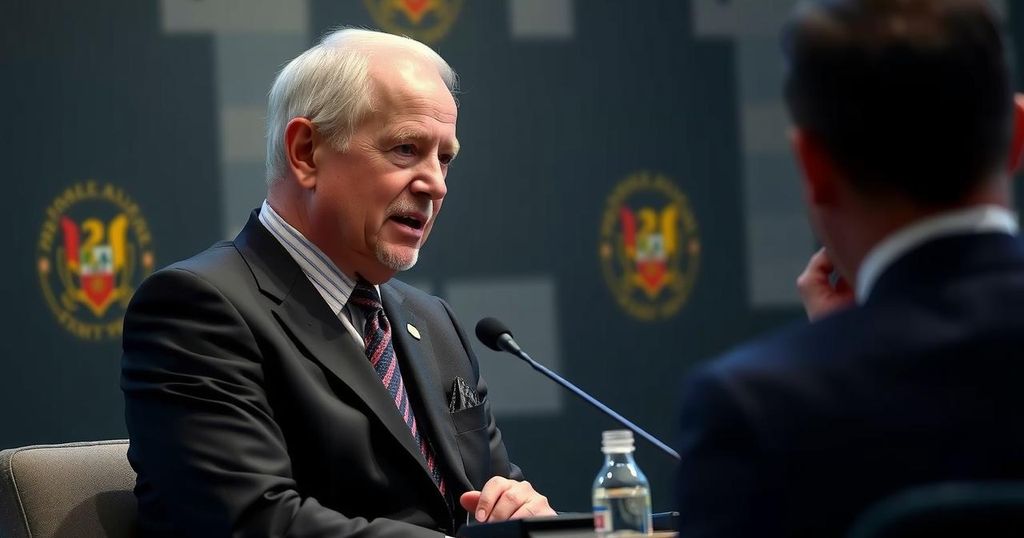Biden Faces Challenges at APEC Summit Amidst Rising Chinese Influence

President Joe Biden, arriving at the APEC summit in Peru, is overshadowed by Chinese President Xi Jinping’s significant engagements, particularly the inauguration of a new megaport in Chancay. Biden’s weakened position reflects a shift in Latin American alliances towards China, exacerbated by the potential return of Trump’s ‘America First’ policies. The megaport stands as a symbol of China’s growing influence in a region traditionally aligned with the United States, complicating Biden’s efforts to assert American leadership.
As President Joe Biden approaches the Asia-Pacific Economic Cooperation (APEC) summit in Lima, Peru, he does so under less than favorable circumstances, overshadowed by rising Chinese influence exemplified by President Xi Jinping. Contrary to what might have been a fortuitous occasion for Biden to strengthen U.S. ties in Latin America, he arrives as a diminished figure, coinciding with the renewed prominence of Trump’s ‘America First’ agenda. Xi’s inauguration of a significant $1.3 billion megaport in Chancay, Peru will serve as a glaring indicator of China’s expanding regional influence, a contrast to Biden’s weakened presence. Biden’s challenge is compounded by the geopolitical landscape that sees China gaining ground in South America — a region where U.S. diplomatic efforts are perceived as waning. This port development signals a shift in trade dynamics, effectively shortening shipping routes to China by ten days and transforming regional supply chains. As major Latin American economies pivot towards China for their infrastructure and trade needs, the likelihood of Biden solidifying strategic ties during this summit has diminished. The implications of Biden’s visit go beyond the immediate summit; they raise significant concerns regarding U.S. influence in a historically strategic region now shifting its allegiances. Scholars have noted that China’s robust investments and Xi’s active diplomatic engagements have effectively positioned China as a preferable partner for many Latin American nations, who voice a growing desire for diverse economic ties. This situation serves as a strategic setback for the United States, which is struggling to maintain its standing in the face of China’s calculated outreach. Expert opinions suggest that rather than projecting confidence upon arrival, Biden will be met with the stark reality of an emboldened China underscoring its commitments to Latin America at a time when U.S. influence is perceived to be receding. The dynamics of trade, development, and diplomatic relationships in this important region are undoubtedly evolving, as evidenced by the comprehensive development of infrastructure such as the Chancay megaport, aimed at further integrating China into the Western Hemisphere’s trade routes.
Historically, the APEC summit serves as a platform for leaders in the Asia-Pacific region to discuss economic growth, trade cooperation, and development. However, this year’s summit bears particular significance due to the rise of China’s geopolitical influence in Latin America and the contrasting position of the United States. The construction of key infrastructure projects, such as the Chancay megaport, reflects China’s robust investment strategy in the region, fostering closer economic ties with multiple countries. Biden’s participation comes at a critical juncture, as his administration faces challenges linked to a potentially revitalized ‘America First’ policy under a possible Trump presidency, further complicating U.S. relations in Latin America. The landscape of U.S.-Latin America relations has shifted over recent years, particularly as China’s economic ties have deepened compared to the more traditional relationships the U.S. has held in the region. The perception of diminishing U.S. influence has been fueled by China’s expansive investments and increased diplomatic presence, presenting a notable opportunity for China to establish itself as a dominant force in an area previously characterized by close U.S. relations.
In essence, the impending APEC summit in Peru represents a turning point in U.S.-Latin America relations, marked by the growing dominance of China. President Biden’s trip is overshadowed by a burgeoning Chinese presence epitomized in Xi Jinping’s inauguration of a pivotal megaport. This development signals a significant alteration in trade dynamics and highlights the United States’ struggle to retain its influence amidst changing geopolitical realities. The shift in allegiances and partnerships within South America poses serious questions regarding the future of U.S. foreign policy in the region, one that is now facing formidable competition from China.
Original Source: apnews.com








